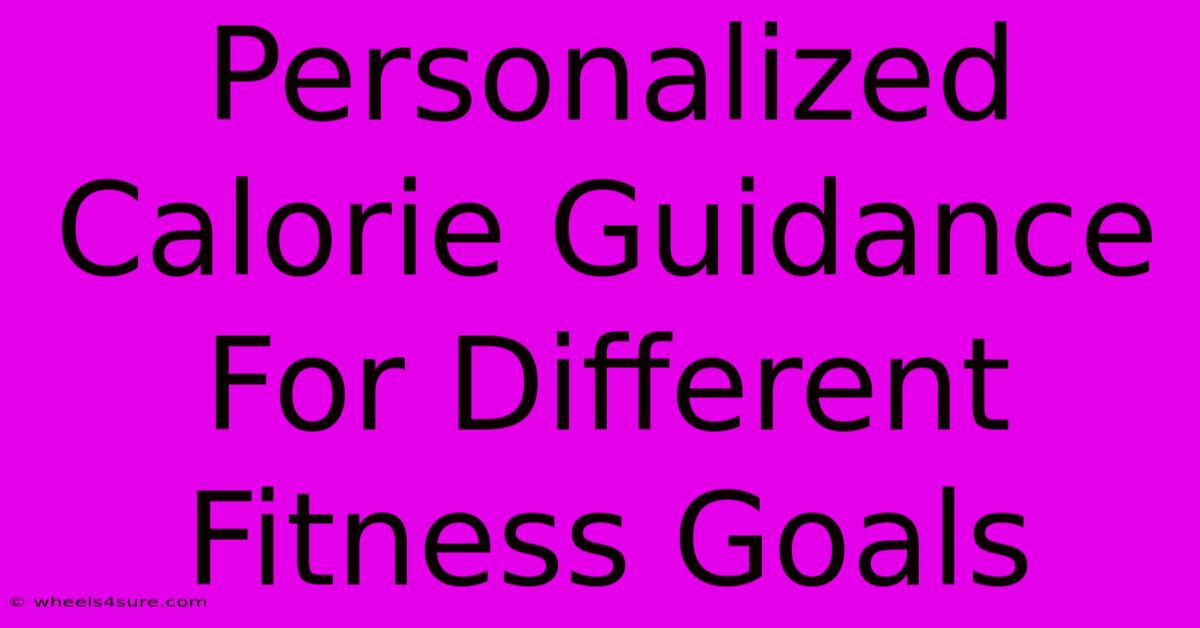Personalized Calorie Guidance For Different Fitness Goals

Table of Contents
Personalized Calorie Guidance For Different Fitness Goals
Reaching your fitness goals – whether it's building muscle, losing weight, or maintaining your current physique – requires a tailored approach. A crucial element of this personalized strategy is understanding and managing your daily caloric intake. This isn't about restrictive dieting; it's about fueling your body effectively to achieve optimal results. This article will delve into personalized calorie guidance for various fitness aspirations.
Understanding Your Caloric Needs: The Foundation of Success
Before diving into specific goals, it's vital to grasp the basics of calorie balance. Your body requires a certain number of calories daily to function, maintain your current weight, and support your physical activities. This is known as your Basal Metabolic Rate (BMR) – the calories burned at rest. Factors influencing your BMR include age, sex, weight, height, and muscle mass.
To determine your daily caloric needs, you also need to consider your Activity Level. This involves calculating the calories you burn through exercise and daily activities. Online calculators and fitness apps can help estimate your Total Daily Energy Expenditure (TDEE), which combines your BMR and activity level.
Key Considerations:
- Accurate Measurement: Use reliable methods to track your food intake and physical activity. Food scales and fitness trackers can significantly improve accuracy.
- Individual Variation: Caloric needs are highly individual. What works for one person might not work for another.
- Professional Guidance: Consulting a registered dietitian or certified personal trainer can provide tailored guidance and ensure your approach is safe and effective.
Calorie Strategies for Specific Fitness Goals
1. Weight Loss: Creating a Caloric Deficit
To lose weight, you need to consume fewer calories than your body burns. This creates a caloric deficit, forcing your body to tap into stored fat for energy. However, it's crucial to approach this deficit gradually and healthily. A rapid, extreme deficit can lead to muscle loss, fatigue, and nutrient deficiencies.
Strategies for Weight Loss:
- Moderate Caloric Deficit: Aim for a deficit of 500-750 calories per day. This generally translates to a safe and sustainable weight loss of 1-2 pounds per week.
- Prioritize Nutrient-Dense Foods: Focus on whole, unprocessed foods rich in protein, fiber, and micronutrients to stay full and satisfied on fewer calories.
- Regular Exercise: Combine a calorie deficit with regular exercise for faster and more sustainable results. Cardio and strength training are both beneficial.
2. Muscle Gain: Caloric Surplus and Protein Intake
Building muscle requires a caloric surplus – consuming more calories than your body burns. This provides the energy your body needs for muscle protein synthesis. However, simply eating more calories won't automatically build muscle. You also need adequate protein intake to fuel muscle growth.
Strategies for Muscle Gain:
- Moderate Caloric Surplus: Aim for a surplus of 250-500 calories per day. This gradual surplus minimizes fat gain while maximizing muscle growth.
- High Protein Intake: Consume 1.6-2.2 grams of protein per kilogram of body weight daily. Protein is the building block of muscle tissue.
- Resistance Training: Engage in regular strength training exercises to stimulate muscle growth.
3. Maintaining Weight: Caloric Balance
Maintaining your current weight requires a caloric balance – consuming roughly the same number of calories as your body burns. This prevents weight fluctuations and helps you sustain your fitness levels.
Strategies for Weight Maintenance:
- Consistent Caloric Intake: Monitor your calorie intake to ensure you're consistently meeting your TDEE.
- Balanced Diet: Focus on a balanced diet rich in fruits, vegetables, whole grains, lean protein, and healthy fats.
- Regular Exercise: Maintain a regular exercise routine to burn calories and maintain muscle mass.
Beyond Calories: The Importance of Macronutrients and Micronutrients
While calories are essential, they're only part of the equation. Macronutrients (protein, carbohydrates, and fats) and micronutrients (vitamins and minerals) play vital roles in your overall health and fitness goals. Your personalized plan should consider the ideal ratio of these nutrients based on your individual needs and goals.
In Conclusion:
Personalized calorie guidance is a cornerstone of effective fitness. Understanding your body's needs, setting realistic goals, and employing the right strategies can significantly enhance your chances of success. Remember to consult with healthcare professionals to ensure your approach aligns with your individual health status and goals. A tailored plan, combined with consistency and dedication, will pave the way to achieving your fitness aspirations.

Thank you for visiting our website wich cover about Personalized Calorie Guidance For Different Fitness Goals. We hope the information provided has been useful to you. Feel free to contact us if you have any questions or need further assistance. See you next time and dont miss to bookmark.
Featured Posts
-
How Much Is Bam Margera Worth In 2024
Apr 12, 2025
-
Mike Woodsons Daughter Beyond The Game
Apr 12, 2025
-
Lost In Son Doong A Surreal Journey
Apr 12, 2025
-
Saif Ali Khan S Son Maintaining Privacy
Apr 12, 2025
-
Outsmart Your Foes Advanced Veilguard Gameplay
Apr 12, 2025
